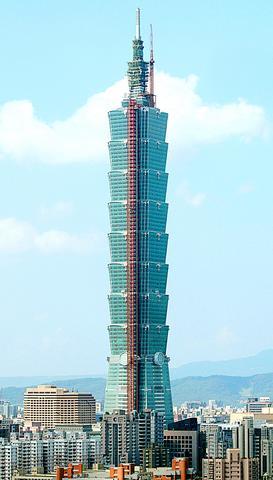The Taipei 101 office building laid claim to the title of the world's tallest skyscraper following a ceremony yesterday to position a 60m spire on top of the structure.
With the addition of the spire, the building boasts of a full height of 508m, eclipsing Malaysia's Petronas Twin Towers, a company executive said yesterday.
"We believe that Taipei 101 will bring a fresh taste to Taipei's skyline," said Lin Hong-ming (

PHOTO: REUTERS
Lin hopes the landmark, though still under construction, will attract more tenants in the Hsinyi district.
Though the leasing of office space is still in its initial stages, Lin expects about 80 percent of the 60,000 ping at Taipei 101 will be leased within 18 months.
"What concerns our potential tenants is how to earn more money after moving into Taipei 101 [with around-the-clock services] rather than saving money through lower rentals," Lin said.
Jones Lang LaSalle Taiwan, the primary leasing agent for the Taipei 101 tower, is not sure about the leasing prospects, however.
"We're seeking the right price and right tenants, who will have long-term occupancies. We're not in a rush," Matthew Shaw, director of Jones Lang LaSalle Taiwan, told the Taipei Times.
Property-market watchers said that slow corporate spending, a lukewarm office market, an increasing supply of office space and high rental rates charged by the Taipei Financial Center could dash the company's hopes.
"Eighty-percent occupancy is an aggressive target. I doubt many potential tenants are available now as big international companies such as Hewlett-Packard Co and IBM Corp just signed new lease contracts for new offices in the area," said Derek Huang (
Though Taiwan's economy is showing signs of recovery, the resilience has not extended to the office market, Huang added.
Carol Su (
For the moment, corporate CEOs are unlikely to rent luxury offices, Su said.
Another factor that could slow Taipei 101's leasing progress is the impact of the Sept. 11, 2001, attack on the twin towers in New York. Su said the attacks appear to have dampened multinational corporations' interest in skyscrapers.
A growing supply of office space in the Neihu and Nankang districts also put the leasing plan in trouble as those offices are attractive to companies looking for lower rental rates, Huang said.
Rents are about NT$1,100 per ping per month and NT$600 per ping per month in the Neihu and Nankang areas, respectively, according to Huang.
The rents will range from NT$3,000 to NT$4,000 per ping for tenants of Taipei 101, an official at the Taiwan Stock Exchange, one of the skyscraper's major shareholders and future tenants, said last month.

CHAOS: Iranians took to the streets playing celebratory music after reports of Khamenei’s death on Saturday, while mourners also gathered in Tehran yesterday Iranian Supreme Leader Ayatollah Ali Khamenei was killed in a major attack on Iran launched by Israel and the US, throwing the future of the Islamic republic into doubt and raising the risk of regional instability. Iranian state television and the state-run IRNA news agency announced the 86-year-old’s death early yesterday. US President Donald Trump said it gave Iranians their “greatest chance” to “take back” their country. The announcements came after a joint US and Israeli aerial bombardment that targeted Iranian military and governmental sites. Trump said the “heavy and pinpoint bombing” would continue through the week or as long

TRUST: The KMT said it respected the US’ timing and considerations, and hoped it would continue to honor its commitments to helping Taiwan bolster its defenses and deterrence US President Donald Trump is delaying a multibillion-dollar arms sale to Taiwan to ensure his visit to Beijing is successful, a New York Times report said. The weapons sales package has stalled in the US Department of State, the report said, citing US officials it did not identify. The White House has told agencies not to push forward ahead of Trump’s meeting with Chinese President Xi Jinping (習近平), it said. The two last month held a phone call to discuss trade and geopolitical flashpoints ahead of the summit. Xi raised the Taiwan issue and urged the US to handle arms sales to

State-run CPC Corp, Taiwan (CPC, 台灣中油) yesterday said that it had confirmed on Saturday night with its liquefied natural gas (LNG) and crude oil suppliers that shipments are proceeding as scheduled and that domestic supplies remain unaffected. The CPC yesterday announced the gasoline and diesel prices will rise by NT$0.2 and NT$0.4 per liter, respectively, starting Monday, citing Middle East tensions and blizzards in the eastern United States. CPC also iterated it has been reducing the proportion of crude oil imports from the Middle East and diversifying its supply sources in the past few years in response to geopolitical risks, expanding

Pro-democracy media tycoon Jimmy Lai’s (黎智英) fraud conviction and prison sentence were yesterday overturned by a Hong Kong court, in a surprise legal decision that comes soon after Lai was jailed for 20 years on a separate national security charge. Judges Jeremy Poon (潘兆初), Anthea Pang (彭寶琴) and Derek Pang (彭偉昌) said in the judgement that they allowed the appeal from Lai, and another defendant in the case, to proceed, as a lower court judge had “erred.” “The Court of Appeal gave them leave to appeal against their conviction, allowed their appeals, quashed the convictions and set aside the sentences,” the judges